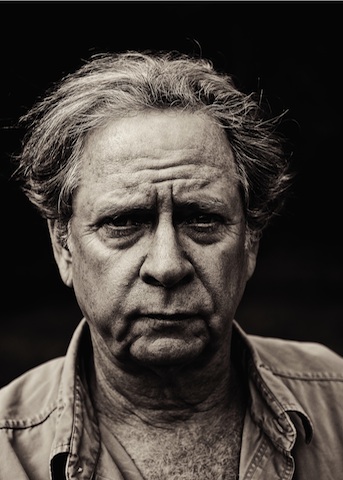Padgett Powell

ABOVE: PADGETT POWELL. PHOTO COURTESY OF GATELY WILLIAMS.
Americans are obsessed with communication. In the explosion of new ways to talk to each other—cell phones, email and social media—one way has been lost; plain old face to face conversation. In Padgett Powell’s deliciously human dialogue You & Me (Ecco) two men sit on a porch somewhere in the South and just talk. Their discussion is not drawing room banter, but whiskey fueled, hard truth, gap-toothed America at its best. From golden Old Hollywood stars to classic cars, family fables, Miles Davis, and the ins and outs of loneliness and life, Powell creates her dialogue so deftly that we feel we are sitting alongside these men, somehow caught up in their discussion. Slyly funny, sometimes silly, irreverent, impudent, and brash, Powell has crafted a conversation that is comically American, with a free and wild heart.
We spoke with Powell about the history of talk in America, how new technology has crippled us, tattoos, failure, why real life blows and how we can escape it—if only for a while.
ROYAL YOUNG: Let’s talk about conversation in America and how that’s shaped the American mind.
PADGETT POWELL: Good lord, man.
YOUNG: [laughs] Sorry, it’s a big question.
POWELL: I don’t know any more about America than one knows being trapped in it. Conversations are the most direct way to connect with people. There’s conversations and violence. There’s a lot of phones; but I’m out of that field. They make me feel like a prisoner of war; there’s not going to be any texting for me. The pre-paid phone is the frontier of my technological advance. I already had one voided by AT&T, cause I didn’t pay as I went.
YOUNG: They want you to keep talking.
POWELL: They do. It’s hard to say conversation has become a minimal thing, because look at the rise of mobile communications in the last 10 years. It used to be only the President had a mobile phone. Now everyone on earth, even if they have nothing else, they have a cell phone. It’s a larger anthropological shift in my mind than even the tattoo age in the United States. It used to be the only people who had tattoos were in the navy, in prison, or working at a carnival.
YOUNG: We have two huge cultural shifts. But tattoos are still a sub-culture, whereas with the cell phone, we’ve become so addicted to connecting with other human beings that in the multitude of connection, we lose something.
POWELL: You’re right. Because what’s being done on these cell phones is all, “Hi,” “Hi,” it’s a lot of military strategy, logistics.
YOUNG: Healthy desires versus healthy choices. We’re faced with that constantly.
POWELL: I’ve had an addiction for a long time to the whole business of maximizing one’s potential, what I call human activation. The vehicle for actualizing oneself is choice, options, seeking out the proper choices.
YOUNG: Do you feel like conversation if healing?
POWELL: No, if you push it in artificiality, you can make it entertaining. In terms of writing a book it’s great fun, I don’t know that it’s so much fun in real life doing it. But who cares about real life?
YOUNG: Do you not like real life?
POWELL: No. Real life blows.
YOUNG: [laughs] Why?
POWELL: It’s terrifying.
YOUNG: How do you get away from it?
POWELL: Writing books is a nice retreat. There’s nothing quite like diving into a book for a few hours. That is a big time vacation. Heavy booze is a big time vacation, but you come back with a headache. There are various little escapes.
YOUNG: They’re temporary though. We can’t help but live. It’s all around us. So the question becomes: how do we deal with it?
POWELL: Well, we put on our pants and we walk straight forward.
YOUNG: I wanted to talk to you about failure.
POWELL: Failure is connected to that life of choices, options and actualization. Failure is the other end of that spectrum and I must say it’s the more attractive end, isn’t it? Isn’t it a richer, more risky territory than all this goddamn succeeding?
YOUNG: I’m torn. I understand as an idea and as a way to stay humble why failure is important, but I also think success is important, I just think it’s become more about winning than doing something important. That’s dangerous.
POWELL: You have better ideas about this than I do. I should be interviewing you. Maybe you can help people. Help the people, Royal!
YOUNG: [laughs] I need to help myself first, Padgett. Let’s talk about what we call things, and how that changes the shape of what they are.
POWELL: Here’s an interesting little story about naming. I just got my 90 year-old cousin a book agent. There’s a character in the book named Studio Becalmed who has brothers named Duncan and Ansford, those are real names of real people, this 90 year-old cousin of mine’s uncles. There is no Studio. The sloppy thesis here is between names of people who don’t exist and those who do, you can create characters who exist. That’s airheaded.YOUNG: No, I think making up names is an important thing.
POWELL: Well that’s part of fiction, creating a world better than the one you live in.
YOUNG: How do you feel that it’s better?
POWELL: More telling and more fun.
YOUNG: Where are you right now?
POWELL: I’m in Miami right off the main boulevard, looking north at a multitude of condominiums.
YOUNG: That’s not fun?
POWELL: Well, it’s okay. I’m going to walk down to be a thrift store I heard about and that’s going to be fun. I heard they have really good old shit in it.
YOUNG: What kind of hold does the past have on us?
POWELL: In trying to forget it, which is what we all try to do, we propel ourselves in a different way into the future.
YOU & ME COMES OUT TOMORROW, JULY 31ST.






